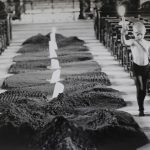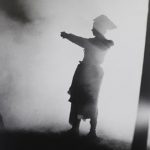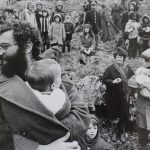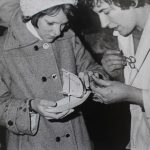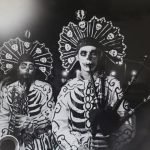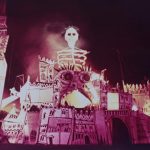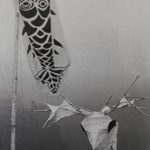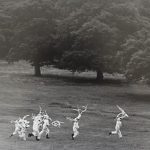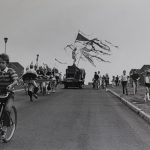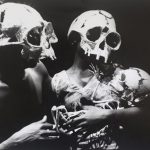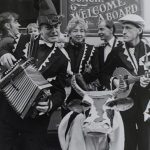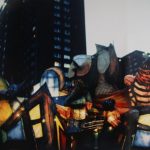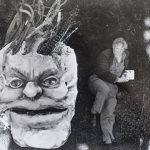Company Name: Welfare State, became Welfare State International in 1979.
Founders: John Fox and Sue Gill and ‘over a dozen teacher and students working in and around Bradford Art College’ (Eyes on Stalks, 2002). Later joined by Boris Howarth and Maggie Howarth.
Established: 1968
Reason: To make art as accessible as ‘free dentures, spectacles and coffins.’ (Eyes on Stalks, 2002)
Current status: WSI closed on 1st April 2006. John Fox and Sue Gill now operate as Dead Good Guides.
Area of Work: Community & Street: street theatre, pageants and rites of passage ceremonies
Policy: The 1972 manifesto:’An Entertainment, an Alternative, a Way of Life.We make images, invent rituals, devise ceremonies, objectify the unpredictable and enhance atmospheres for particular places, times, situations and people. We are artists concerned with the survival and character of the imagination and the individual with a technologically advanced society.’ (Eyes on Stalks, 2002)
Based: Touring theatre company, initially based in Leeds moved to Burnley in 1973. Toured internationally from 1975. Changed from a touring company to community based celebratory arts company in 1982, based in Ulverston, Cumbria
Funding: Festivals in Britain and abroad, The British Arts Council, Arts Associations, Art Centres and private individuals for Naming and Wedding Ceremonies.
Performance Venues: Site-specific venues, unique to each particular event.
Audiences: Everyone from Glasgow council estates to International Theatre Festivals.
More images can be found on John Fox and Sue Gill’s web page.
Company work and Process: Welfare State were founded in December 1968 by John and Sue Fox and over a dozen teachers and students from Bradford Art College. The company were joined by Boris Howarth and his wife Maggie in 1970. Fox worked as a lecturer at Bradford College of Art with Albert Hunt, and later as Senior Lecturer in the Fine Art department of Leeds Polytechnic. Alongside the students from the college, the company worked as a Collective of artists under the leadership of John and Boris. Their first event was The Marriage of Heaven and Hell. Other small touring shows were Superman and the Fleas, The Humpback Jester and Punch and Judy. Large-scale productions included St Valentine’s Day Firestorm and the The Sweet Misery of Life Show.
1970s
These early agitprop performances were often particularly subversive, but after The Sweet Misery of Life Show in London they decided to focus on creating Celebratory Theatre, and in 1972 the company marched and performed for a month along a West Country ley lines with the Travels of Lancelot Quail: The First Going Away. In 1972 the Mid-Pennine Arts Association invited Welfare State to take up residence in Burnley as associated theatre fellows. The focus of their work became skill teaching and research into the arts and community. In 1973 they created Beauty and the Beast, a performance installation in landscape.
Welfare State signature work was a mixture of visual spectacle, popular theatre, music, food and celebration. Emanating from the political ideologies of late Sixties Britain, they recaptured theatre from the middle-class, buildings-based theatre and led a resurgence in popular theatre traditions such as Carnival, Feast of Fools, mummers plays, fairground and folk traditions. Welfare State believed that myth and archetype were intrinsic to human consciousness, and the company worked closely with communities to create new myths, new traditions and new festivities to celebrate our shared humanity. Welfare State’s approach involved preliminary research into local history, geography and customs, to find themes with which a local audience could identify. Weeks of consultations, workshops, sideshows and skill-bartering culminated in performances that combined the company’s own work with the relevant themes from that particular community.
From 1975 Welfare State continued to tour further afield and established an international reputation for site-specific theatre, going on to become Welfare State International in 1979, with the registered educational charity company name of Galactic Smallholdings Ltd. Whilst still a touring company, Welfare State spent up to a third of the year in Burnley. Despite occasional conflicts with the local community, Welfare State provided the town with a number of large scale theatrical events such as the first Parliament in Flames, which drew audiences of up to 10,000 and became a regular November celebration. As the company developed, the students turned associates began to seek collective control over the company. Due in part to these organisational differences, in 1976 the company split into two, with the greater part of Welfare State leaving to become I.O.U (Independent Outlaw University), another successful performance art company. Following the split, the structure of Welfare State was made up of two Artistic Directors, two Administrators and a Technical Director. The other creative and technical workers were freelance associates who joined the company for specific projects.
In 1977 the company staged a production that brought together the research and experience that has been accumulated over the previous 9 years. The show was called The Love, Lives and Murders of Lancelot Barrabas Quail. The company left Burnley in 1978, John and Sue went on sabbatical to Bali and Australia, returning home in 1979, when they moved to Ulverton in Cumbria. Whilst John and Sue were away, Boris Howarth took over as Associate Artistic Director of Welfare State International. In 1978, he directed Uppen Down Mooney written by Welfare State’s the long-term collaborator Adrian Mitchell.
1980s
Into the 1980s, the company changed direction towards more community focused work, and events were made for small communities of local people, marking seasonal occasions like Harvest and Winter, with the idea of the ‘Feast’ central to the event. Another event that became a successful keynote for the company was the Barn Dance. In December 1982, the company created Winter Satellite, a yuletide celebration for three Lancashire villages, Scarecrow Zoo and The Doomsday Colouring Book, an on-going series of contemporary mystery plays was premiered in Bracknell in Berkshire, and toured in the summer of 1982.
Since their origin the company had always performed a mixture of public and private ceremonies, notably naming ceremonies, weddings and funerals. Non of the participants felt that an orthodox religious ceremony would be appropriate to their views, so they had started devise their own ceremonies to celebrate the birth of their own children and other important transitions and life milestones. A journey which sought to carry theatre into the realm of anthropology and to recreate a social role for artists. John and Sue went on to release two books on this theme: The Dead Good Book of Baby Naming & Welcoming Ceremonies and The Dead Good Funerals Book.
In 1981 the company started a regular summer school and residencies were taken up in the Cleveland village of Thorpe Thewles and the island of Toronto Harbour in Canada, where the company created the Tempest of Snake Island. In 1982, Welfare State International travelled to Japan to create The Wagtail and the Wasteland, the event was voted the year’s best drama event by PIA magazine, Tokyo’s equivalent to Time Out. In 1983 they continued their success by Raising the Titanic. In 1985, the company created Nutcracker at the Commonwealth Institute in co-production with the National Performing Arts Company of Tanzania. In 1986 the company returned to Canada, to perform six performances at the False Creek Expo in Vancouver. Other epic out-door events that toured in the 80s included Blood Pudding, Eye of the Peacock and Tales for England.
Now resident in Ulverston, in 1983 Welfare State International created Ulverston’s first Lantern Parade, this yearly tradition still continues to this day. From 1984 onwards, the company created some small touring shows designed to fit into spaces such as village halls, community centres and household living rooms. They worked with a cast of four in a van, or two in an estate car. The first show was a two hander performed by Boris and John in a vaudeville style around clubs in the north, the show was about the revolutionary mutineer Percy Toplis and was written by Ian Wedde. The following show On the Perimeter was created by John and Sue in 1985 .
In 1983 Welfare State began 7 years work in Barrow-in-Furness, the same year the company created a full-length community film King Real and the Hoodlums. Over the years the relationship with the people of Barrow developed, and by 1987 they had gained sufficient popularity and acceptance to create a major celebration with the Barrow Town Hall Tattoo. In the years that followed the company focused their work towards regeneration of urban areas.
1990s
In 1990, following an 18 month residency, they created All Lit Up, it was the biggest Lantern Festival in Europe and part of Glasgow’s City of Culture. Throughout the 1990s and 2000s the company continued to create events for smaller communities and Ulverston became a base for Vernacular Arts including Rites of Passage ceremonies.
Closure and beyond
Welfare State International closed in 2006, the educational charity continued under a new name, with the building, the staff and a full ACE grant. The new company Lanternhouse International failed to sustain its funding and was forced to close a few years later. Dead Good Guides Sue Gill and John Fox’s new company picks up where Welfare State International left off. For 38 years Welfare State thrived under the leadership of John Fox, Sue Gill, Boris and Maggie Howarth, and the various ensemble of associated artists. The company enabled tens of thousands of people across the globe, from all walks of life, to embrace and create wonderful, original art for their own communities and inspired countless artists, theatre makers and celebrants to pursue their own vocations. They devised new, visual, celebratory theatre and ceremony and earned widespread recognition at home and internationally, but above all, Welfare State’s International will be remembered for their unique brand of mythical poetry, and the underlying principles in the work that went far beyond the realms of entertainment.
Personal appraisals and thoughts:
John Fox: ‘At the moment, art is thought of as a peripheral decoration and artists are part of the star system. If you’re lucky enough to climb into the right stable and are promoted in the right way, you’ll become a success. I think that is a fundamental mistake. … There should be fine art in the streets, and fine art in action. You can have children and grannies with no experience of art, making wonderful things that all fit together as part of a jigsaw for trained visionaries who make extraordinary images.’
‘People don’t live for bread alone, but for the spirit, excitement and a sense of community. Art has a very strong role in all these, and we have got to find a new way of making art and using it. We have to think about its role, and not just use it as an isolated activity for an elite.’ (Scotland on Sunday, September 1990)
John Fox:‘In terms of resources, words and materials used, celebration is something produced through constant negotiation with its intended participants – negotiation as both a political process and an epic journey to rebuild the necessary bridges between the domestic, the social and the mythic. It is a living theatre created not for an audience but for a community – and if no community exists it may be necessary to invent one.’ (Theatre Quarterly, August 1988)
Listen to some audio extracts from John Fox and Sue Gill on:
The origins of the company
Processional Theatre
Sweet Misery of Life
Sue Gill’s name
The Ulverston Lantern Festival
Reviews:
Beauty and the Beast
‘The Welfare State use the whole site for their performance from the roadway in. The show is, eerily, all around you. At the far end, on one slope, a wrecked aeroplane pours smoke from its fuselage. Masked figures peer silently out of a ramshakle hut halfway up an opposite slope. In between the two is the main site area. The audience that gathers is conducted round it as if it’s a guided tour of the Welfare Stately home of the actors’ minds. First into the ‘Labyrinth’, a decaying mass of junk lived in by pent-up crazed individuals, each one with his own obsessive occupation: a thin greenish man with Dr Phibes eyes dissecting carcasses of small animals, an ageing girlish tap-dancer dancing with incessant weary roguishness in a space like a wardrobe, a manic ‘camp commandant’ shouting imprecations from a roof. It’s claustrophobic and appalling. By stages there’s a progression to the Big Top. Inside the tent there’s total contrast – air after oppression, possible flight after crippledness. It’s a large area, filled with sand and ice and a few large glowing masks. Within the circle of Ice that’s set around the central tent pole sits a quiet beautiful woman, sometimes singing, sometimes weaving.’ (Time Out, May 1973)
‘Welfare State International are brilliant at turning an audience of strangers into a community.’ (The Guardian, 1985)
Other comments
‘One of the most refreshing experiences of my life. I still draw on the memories of its richness for strength, and for the certainty that there are many ways of doing things and some are a great deal more life-enhancing that others’. ( Peter Stark, Director of Northern Arts)
‘Since the advent of John Fox’s spectaculars of ritual procession in Yorkshire and the Welfare State International company 45 years ago, much of our most potent theatrical and installation art has taken place in outdoor landscapes, on rivers and hilltops, in forests and fields.’ (Michael Coveney, The Guardian, 2013)
‘I would say that culturally, the Welfare State International are the best thing that ever happened to Ulverston’.(Mayor of Ulverston)
Productions: A full list of productions can be found in the appendix of Engineers of the Imagination (1990)
PRODUCTION NAME VENUES DATES
The Marriage of Heaven and Hell Lancaster 1968
Superman and the Fleas
Street Theatre TourNorth Yorkshire 1970
Sweet Misery of Life Show Tour 1971
The Travels of Lancelot Quail South West Tour 1972
Beauty and the Beast Aberystwyth Arts Centre, Burnley 1973
Parliament in Flames Burnley, Ackworth, Tamworth, Milton Keynes, Catford 1973 - 1981
The Island the Lost World Burnley 1976
Stories for a Winter's Night Basildon, Norwich, Chorley 1976
The Love, Lives and Murders of Lancelot Barrabas Quail Burnley 1977
Fountain of Change Lille, France 1977
Uppen Down Mooney Corby Festival 1978
When the Pie was Opened Welwyn Garden City 1979
The Plague and the Cowman Ackworth 1979
The Eye of the Peacock Kendal 1980
Tempest of Snake Island Canada 1981
Snow Sculpture Finland 1981
Barn Dance Tour 1981
Winter Satellite Tough of Bowland 1982
Scarecrow Zoo Bracknell 1982
The Wagtail and the Wasteland Japan 1982
The Doomsday Colouring Book Tour 1982
Charter Week Raft Race Ulverston 1982
Ulverston Lantern Parade Ulverston 1983
Raising the Titanic Limehouse, London 1983
King Real and the Hoodlums Barrow in Furness 1983
Tolpuddle Day Darlington 1984
Double or Quit Tour 1984
Tales for England Tour 1985
Nottingham Residency?? Nottingham 1986
On the Loose Cardiff, Trafford Stirling, Stranraer 1986
Lantern Coach Jack and the Beanstalk' West Cumbria, Dumfries and Galloway 1986
False Creek Expo Vancouver 1986
Barrow Town Hall Tattoo Barrow in Furness 1987
All Lit Up Glasgow
1990
Interviewee reference: John Fox and Sue Gill
Links: Dead Good Guides
Existing archive material: Bristol Theatre Archives
Bibliography:
Engineers of the Imagination edited by Tony Coult and Baz Kershaw (Methuen, London 1983)
The Dead Good Funerals Book by Sue Gill and John Fox (Engineers of the Imagination, 1996)
The Dead Good Book of Naming and Baby Welcoming Ceremonies by Sue Gill and John Fox (Engineers of the Imagination, 1999)
The Dead Good Time Capsules Book ed. Gill Gill with John Fox (Engineers of the Imagination, 1999)
Eyes on Stalks by John Fox (Methuen, London, 2002)
Acknowledgements: This webpage was assembled with generous help of John Fox and Sue Gill. We are enormously grateful to them for contributing their personal collections of images, scripts and assorted ephemera, as well as their reflections and time. Thanks also to Yumiko Malone for her translations of Japanese reviews of The Wagtail and the Wasteland. This page has been written and constructed by Ray Malone. November 2013
This page was created with support from the National Lottery through the Heritage Lottery Fund.

